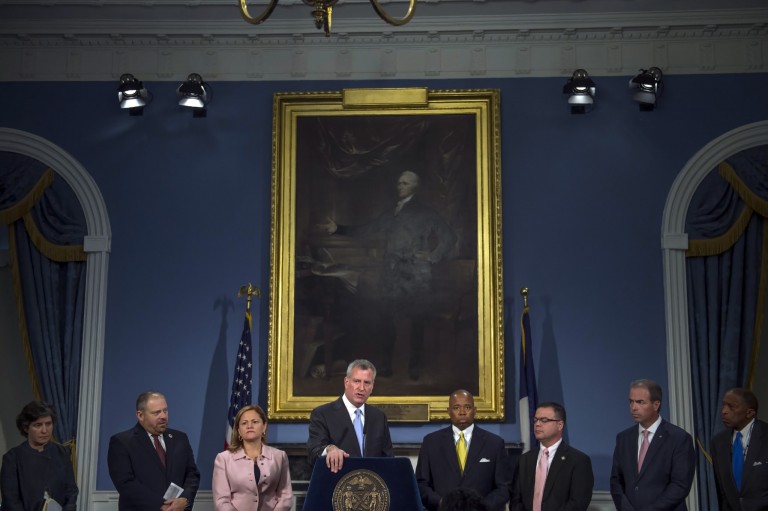PHOTO: In October, days after an NYPD police officer was gunned down in the line of duty, Mayor de Blasio called for a change in state law to allow judges to consider public safety risk in determining an individual’s bail amount. Photo Courtesy of Ed Reed/Mayoral Photography Office
By Michael V. Cusenza
Last October, after it was revealed that the career-criminal who allegedly shot and killed city Police Officer Randolph Holder was able to do so, in part, because he had been granted outpatient drug treatment instead of incarceration for an earlier narcotics arrest, Mayor Bill de Blasio vowed to quickly produce a proposal to reform the bail system.
“The death of Officer Randolph Holder was a clear and tragic signal that we must ensure dangerous individuals with long criminal histories do not walk our streets. Yet as the law stands, judges can only consider risk of flight when determining a bail amount,” de Blasio noted last year. “Our judges must be able to look at how dangerous someone is when they decide how much bail is set – and should look at these factors when they decide whether to divert someone away from jail. If someone poses a significant threat to our city’s safety, they must be behind bars – and today’s announcement is a strong step toward keeping our residents, and our hardworking officers, safe from harm.”
Undoubtedly with Holder still in mind, de Blasio last Friday announced the citywide expansion of supervised release, a program designed to cut unnecessary detention and reduce reliance on monetary bail.
Judges citywide can now assign eligible, lower-risk defendants to a supervisory program that allows them to remain at home with their families and continue working while waiting for trial.
“Supervised release is another step towards establishing a more rational approach to bail by moving us closer to a system that assesses the risk a person poses,” said Elizabeth Glazer, director of the Mayor’s Office of Criminal Justice. “It is a common sense approach that balances public safety and liberty by expanding the options available to judges beyond simply detention or release with no conditions.”
According to the administration, the program was developed in close partnership with the Office of Court Administration, the five District Attorneys’ offices, the defense bar, and national experts. The $17.8 million initiative will be able to supervise 3,000 defendants each year, allowing them to remain in the community rather than in jail while waiting for trial. Key features of the program include:
Risk-Driven Eligibility Screening
Providers are using a new validated risk assessment tool, created by the Criminal Justice Agency, to determine eligible candidates and set an appropriate level of supervision.
The target population is individuals who have been assessed to not pose a public safety risk and who otherwise would wait for trial in jail.
Individualized Supervision Levels
All defendants in supervised release programs receive phone calls or text message court reminders and supervised release providers conduct a monthly, individualized assessment to determine whether levels of supervision should be adjusted.
Citywide Coverage from Qualified Providers
Providers, de Blasio noted, were selected through a competitive bidding process that assessed ability to effectively supervise, ensure defendants return to court, and facilitate connection to available, voluntary services.
They are:
The Criminal Justice Agency in Queens (560 individuals)
The Center for Alternative Sentencing and Employment Services in Manhattan (850 individuals)
The Center for Court Innovation in Brooklyn (882), the Bronx (630), and Staten Island (126)
Connection to Stabilizing Services
Once defendants are determined to be eligible for supervised release, providers conduct intake and needs assessments to determine whether defendants could benefit from referrals to stabilizing services such as vocational programs, housing opportunities and mental health and substance abuse treatment.
Supervised release is a central feature of the City’s larger effort to reform the bail process by avoiding unnecessary jail time and enhancing the criminal justice system’s ability to protect public safety, de Blasio said.
michael@theforumnewsgroup.com

